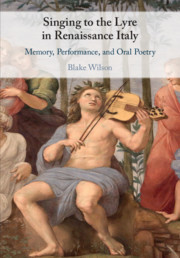Description
Singing to the Lyre in Renaissance Italy
Memory, Performance, and Oral Poetry
Author: Wilson Blake
The first comprehensive study of the dominant form of solo singing in Renaissance Italy prior to the mid-sixteenth century.
Language: EnglishApproximative price 32.87 €
In Print (Delivery period: 14 days).
Add to cart
Singing to the Lyre in Renaissance Italy
Publication date: 08-2021
Support: Print on demand
Publication date: 08-2021
Support: Print on demand
Approximative price 148.73 €
In Print (Delivery period: 14 days).
Add to cart
Singing to the Lyre in Renaissance Italy
Publication date: 11-2019
484 p. · 18x25.3 cm · Hardback
Publication date: 11-2019
484 p. · 18x25.3 cm · Hardback
Description
/li>Contents
/li>Biography
/li>
A primary mode for the creation and dissemination of poetry in Renaissance Italy was the oral practice of singing and improvising verse to the accompaniment of a stringed instrument. Singing to the Lyre is the first comprehensive study of this ubiquitous practice, which was cultivated by performers ranging from popes, princes, and many artists, to professionals of both mercantile and humanist background. Common to all was a strong degree of mixed orality based on a synergy between writing and the oral operations of memory, improvisation, and performance. As a cultural practice deeply rooted in language and supported by ancient precedent, cantare ad lyram (singing to the lyre) is also a reflection of Renaissance cultural priorities, including the status of vernacular poetry, the study and practice of rhetoric, the oral foundations of humanist education, and the performative culture of the courts reflected in theatrical presentations and Castiglione's Il cortegiano.
Introduction; Part I. The Civic Tradition: The Art of the Canterino: 1. Early history: Ioculatores and Giullari; 2. The Trecento Canterino; Excersus 1: Piazza San Martino: performance, urban space, and audience; 3. The Canterino in the fifteenth century; Part II. The Humanist Tradition: Cantare ad Lyram: 4. Florence: from Canterino to Cantare ad Lyram; Excursus 2: Filippino Lippi's portrait of a Canterino; 5. Cantare ad Lyram and humanist education; 6. Cantare ad Lyram in the courts; 7. Rome: Cantare ad Lyrum at the summit; Epilogue: the sixteenth century.
Blake Wilson is Professor Emeritus of Music at Dickinson College, Pennsylvania. He is the recipient of grants and fellowships from the National Endowment for the Humanities (NEH), American Council of Learned Societies (ACLS), Fulbright Program, Harvard Center for Italian Renaissance Studies (Villa I Tatti), and the National Humanities Center. His research interests include the vernacular song cultures of Medieval and Renaissance Italy, Medici music patronage, the musical soundscapes of Italian cities, orality and literacy, and the intersections between aural, visual, and literary cultures. His works have appeared in books, editions, and journals, including the New Grove Dictionary of Music and Musicians, the Journal of Musicology, Early Music History, Recercare, Rivista Italiana di Musicologia, and I Tatti Studies.
© 2024 LAVOISIER S.A.S.





